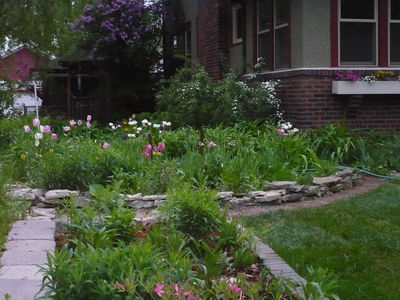
Difference between revisions of "Pollinator friendly Best Management Practices for stormwater management"
m |
m |
||
| Line 27: | Line 27: | ||
====Other links==== | ====Other links==== | ||
| + | *NEW [https://www.eqb.state.mn.us/2017-state-agency-pollinator-report The Environmental Quality Board] recently released a Minnesota State Agency Pollinator Report. The Report includes three specific goals in areas where state agencies have the greatest potential to reduce stress on pollinators. | ||
*[http://www.bwsr.state.mn.us/native_vegetation/Pollinator_Plan.pdf The Board of Water and Soil Resources] has a Pollinator Plan that includes why pollinator populations and habitat restoration matter, current protection and restoration efforts, native seed mixes, a fact sheet and a solar site pollinator habitat assessment form. | *[http://www.bwsr.state.mn.us/native_vegetation/Pollinator_Plan.pdf The Board of Water and Soil Resources] has a Pollinator Plan that includes why pollinator populations and habitat restoration matter, current protection and restoration efforts, native seed mixes, a fact sheet and a solar site pollinator habitat assessment form. | ||
*[http://www.xerces.org/pollinator-conservation/gardens/ The Xerces Society]: Targeted for gardeners, this site contains much useful general information on pollinators and managing for pollinators | *[http://www.xerces.org/pollinator-conservation/gardens/ The Xerces Society]: Targeted for gardeners, this site contains much useful general information on pollinators and managing for pollinators | ||
*[http://www.pollinatorfriendly.org/ Pollinator Friendly Alliance] | *[http://www.pollinatorfriendly.org/ Pollinator Friendly Alliance] | ||
Revision as of 15:43, 17 August 2017
Vegetated stormwater BMPs can be designed to be pollinator-friendly. It is clear that pollinators, both vertebrates and invertebrates, are in decline (see [1], [2], [3], [4], [5]). This page provides numerous links to information that can be used in designing and implementing pollinator-friendly stormwater BMPs.
Caution: Although the following links provide information on pollinator friendly practices, it is important to remember the primary function of a stormwater BMP is to manage stormwater. In particular, it is important to ensure that plants selected as being pollinator friendly must also function well within the stormwater practice. See Design criteria for bioretention and Minnesota plant lists for more information.
Pollinator friendly plants
- Metro Blooms: Planting for Pollinators: How Raingardens Can Help
- The Xerces Society for Invertebrate Conservation: Pollinator plants - Great Lakes Region
- Pollinator Partnership: Ecoregional Planting Guides
- United States Department of Agriculture - Forest Service: Attracting Pollinators to Your Garden Using Native Plants
- National Wildlife Federation: Plants for Pollinators: A Collection of Favorites
- Native Plants and Wildlife Gardens: Top Five Wetland Edge Plants For Pollinators
- Deeproot: Want Pollinators? Plant Trees
Pollinator friendly practices
Although much of the information on these pages is general, many of the practices can be incorporated into vegetated stormwater BMPs.
- United States Department of Agriculture - Forest Service: Pollinator Friendly Practices
- North American Pollinator Protection Campaign: Pollinator Friendly Practices
- Institute for Agriculture and Trade Policy: A landowner’s guide to pollinator-friendly practices
Case studies
- Andover garden tour is a pollinator-friendly showcase
- Andover Pollinator Awareness Project
- Penn State Extension
- Penn State University: Pollinator Garden Certification
Other links
- NEW The Environmental Quality Board recently released a Minnesota State Agency Pollinator Report. The Report includes three specific goals in areas where state agencies have the greatest potential to reduce stress on pollinators.
- The Board of Water and Soil Resources has a Pollinator Plan that includes why pollinator populations and habitat restoration matter, current protection and restoration efforts, native seed mixes, a fact sheet and a solar site pollinator habitat assessment form.
- The Xerces Society: Targeted for gardeners, this site contains much useful general information on pollinators and managing for pollinators
- Pollinator Friendly Alliance
